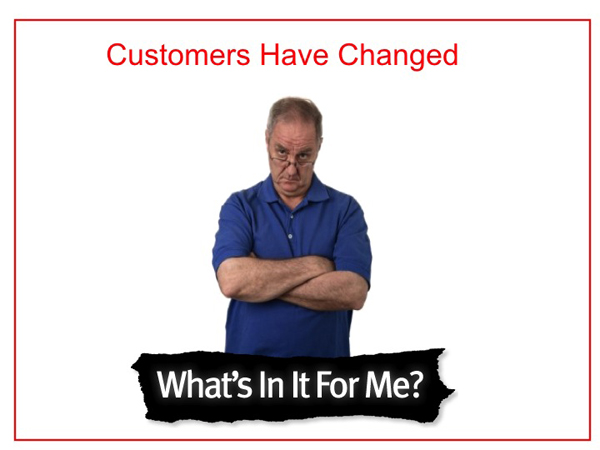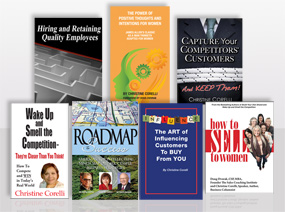
Wake Up! The world is changing more rapidly than ever before and, along with it, so is the customer. They rule. Regardless of whether you sell to consumers or business-to-business, your customer has more choices, is better informed, more cost-conscious, and more demanding than ever. It seems if you don’t give them what they want, how they want it, when they want it at the price they’re willing to pay, they’ll just head over to your competitor.
The way we sell to customers has changed too. For example, it wasn’t too long ago that effectively communicating the quality of our products or services was a powerful influencer in the buying decision. While still vitally important, it takes more to convince them to buy, as today, most customers consider quality a given. Don’t even think of trying to sell to them if you have any quality issues. And of course, that includes the quality of service you and everyone in your company provides. Service excellence is a must.
Today, price wars are tenfold, as emphasized by business expert Tom Winninger more than ten years ago in his book titled “Price Wars”. Your competitors are ready to undersell you in a heartbeat. And, although we do our best to communicate the benefits of our products and services, i.e., value, service excellence, dependability, one-stop shopping, warranties, guarantees, fast-turn around, etc., etc., in today’s real world, price is often the bottom line. So you’d better have a customer loyalty program, frequent buyer program, an instant rebate (people dislike mail-in’s), or package your products smarter than your competitors.
HOW DO WE COMPETE IN THIS TYPE OF ENVIRONMENT?
WHAT SKILLS DO WE NEED?
The world is constantly changing, but psychology is not. Technology is constantly changing but the wants and needs of human beings are not. In today’s world, you need to be fast to adapt to our changing world, accept what is occurring, and work harder than ever to develop strong business relationships. Make your customers feel that you truly care about them and genuinely want to help them, regardless of whether you sell to consumers or business-to-business. Demonstrate this by learning how to convey caring, confidence, and trust, and speaking to your customers and potential customers in terms of what is important to them. If you can become a “master” at sales communication, you’ll see the results.
Develop the ability to put yourself in your customer’s shoes and ask yourself, “How would I feel if I were in my customer’s position?” “What would my concerns be?” “What would I want?” “What would the most important thing be to me, if I were making this purchasing decision?” “How would I feel if money were tight, and I could barely stay afloat?” “How would I feel if I had to take the heat from my boss for making a purchasing decision that doesn’t deliver the results we paid for?” “What else do they need that I can offer to help my customer?” “Does my company need to diversify what we offer, so that we can help them more?” Now, write them down, look at your customers’ concerns. Then, “internalize” the customer’s goals as your own, and go to work to gain their trust, their business, and their loyalty.
When you communicate with customers, don’t tell them how great your product, service, store, or company is. Make it a habit to ask them questions that demonstrate you care about them — “How’s your business doing?” What’s the most important thing to you about this purchase?” “Keeping your budget in mind, what would you like to have in your new home?” “What challenges have you had in the past with other contractors?” “What’s most important to you, style or function?” “What would be convenient for you?” “How can I and my company help you grow your business?” Then, listen. Ask more questions, and listen again. Listen more than you talk.
If you sell business-to-business, learn as much about their business as you can. Apply a consultative approach to selling, and become a trusted ally and advisor. Then, you will position yourself as an ongoing valuable resource to your customer, which is a good place to be, if you want to win their business and their loyalty. Help them all you can, even when there’s nothing in it for you. When’s the last time you helped a customer or potential customer when there was nothing in it for you?
Here’s something you’ve heard before regarding the psychology of why customers buy, yet always warrants reinforcement: Success doesn’t only come from the brilliance of your sales presentation or your gift of gab. Great sales trainers will tell you the customer is not always buying your product or service. More often they’re buying YOU. It’s your “likability level”, your personality, selling style, and how you conduct yourself that becomes a major factor in the buying decision. You must possess the “Like Factor” to influence customers to BUY.
(For a complimentary copy of “The Like Factor and The Spider”, one of our most popular articles, e-mail cc@christinespeaks.com and write “spider” in the subject area.)
Remember:
“It’s your people skills that make all your product and technical knowledge pay off.”
and
“Quality relationships breed long-term profitability.”
Is This Highly Interactive And Personalized Sales Communication Skills Program On Your “Needs” List?
“THE ART OF INFLUENCING CUSTOMERS TO BUY FROM YOU”
The ability to influence others is not only an art, but also a science. You can win over today’s tough customers, and get results faster, by understanding and applying the concepts and theories in the “art” of influencing people. Learn how to use a consultative selling approach, respond to objections, build strong customer relationships, obtain more referrals and present your “personal best” with every customer interaction.
Christine will help you craft highly effective words and phrases that communicate the “whys” of doing business with your company, and the benefits of your product or service. Then, she’ll help you make sure these “whys” come across to your customers. (Can include videotaping and coaching.)
Call us now.

